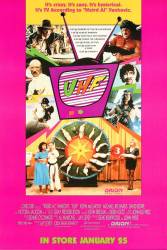Plot hole: R.J. Fletcher is shown as a ruthless businessman who knows everything there is to know about Channel 62 - who owns it, how much it's worth, who is running it, the financial troubles it is having and so on and so on. He is also fully aware of the telethon and the fact that George is selling the station as a going concern for a total of $75,000.00. It is simply asking too much of audience credulity or 'suspension of belief' to think that such a hard-headed businessman would not work out that he could, using stooges, buy a controlling interest in the station for $37,501.00, saving himself a small fortune and closing the station down over the objections of his minority shareholders. Something this blatant could not possibly be a character mistake - he is already planning on buying the station for the full price (from Big Louis) so don't tell me he wouldn't just switch plans and buy it from George instead!
Plot hole: Throughout the telethon we see volunteers taking pledges over the telephone. As with all telethons the vast majority of pledges will be paid by cheque. Instant bank transfers were unknown in the days the film was set and the telethon ends at midnight, at which time American banks are most certainly shut! How does George manage to have $75,000 in CASH for Big Louie on site that very night? Not every single pledge would (or could) go out to the remote site to pay in cash - not at that time of the night, anyway - and he couldn't raise more than the required sum as this was a share offer and an oversell would reduce the value of individual shareholder's equity.






Suggested correction: They were selling stock at the telethon to those in the crowd. At $10 a share, they only needed to sell 7500 shares, and who is to say people didn't buy multiple?
Because they had $75,000 in CASH that night, if they sold 7500 $10 shares to the crowd at the station in order to raise that cash, then the people who pledged their money over the phone and who could not or did not go to the site at the end of the telethon have been cheated out of their money. Lawsuits are coming up.
Not necessarily. Nowhere does it say that they were selling ONLY 7500 shares. That was what they needed to raise the $75,000, but it doesn't mean that was the hard limit. Those pledging over the phone would still get their shares.
If they didn't give anyone any money, they couldn't be cheated out of their money.
Bishop73
Suggested correction: There's nothing to suggest the people on the phone were paying by cheque over the phone. They made their pledge over the phone but came in person to pay in cash and to pick up the stock. That's why there was such a big crowd of people in attendance with cash in hand.
Bishop73